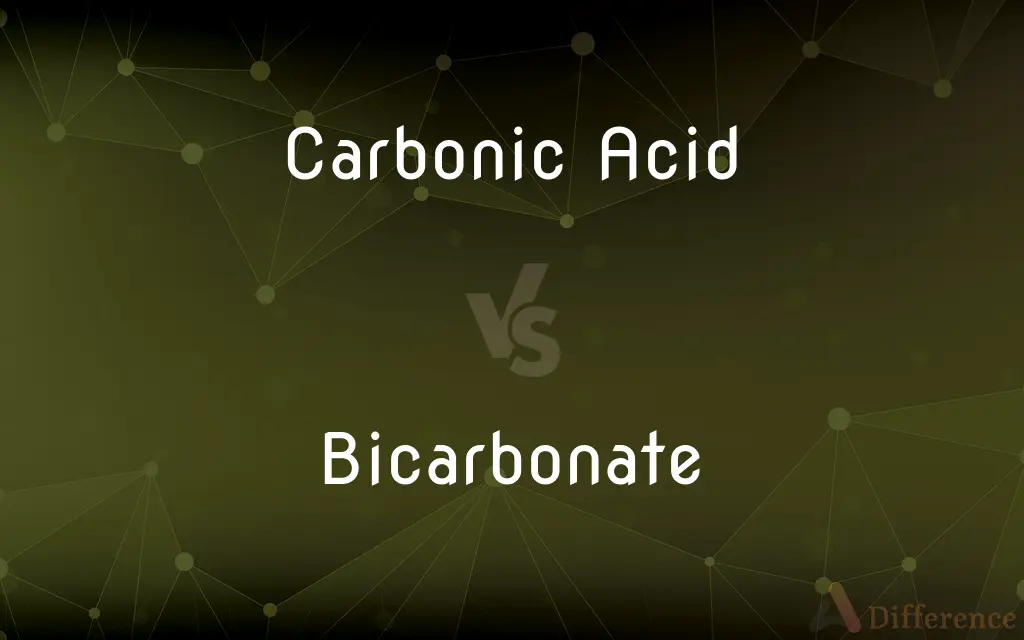Carbonic Acid vs. Bicarbonate — What's the Difference?
By Tayyaba Rehman — Published on November 21, 2023
Carbonic Acid is a weak acid formed when carbon dioxide dissolves in water; Bicarbonate is its anion and acts as a buffer in the blood.

Difference Between Carbonic Acid and Bicarbonate
Table of Contents
ADVERTISEMENT
Key Differences
Carbonic Acid is a compound that results from carbon dioxide (CO₂) being dissolved in water. This acid is important in various biological processes and plays a vital role in maintaining the body's pH levels. Bicarbonate, on the other hand, is the anion (HCO₃⁻) derived from Carbonic Acid.
When Carbonic Acid loses a proton, it forms the Bicarbonate ion. Bicarbonate is essential for maintaining the pH balance within the blood, ensuring that it remains neither too acidic nor too alkaline.
In environmental contexts, Carbonic Acid can cause the acidification of bodies of water when CO₂ levels rise. Concurrently, Bicarbonate acts as an intermediate species in the buffering systems that resist sudden changes in the pH of water or blood.
In essence, while both Carbonic Acid and Bicarbonate are intricately linked, one is the acid, and the other is its consequential anion.
Comparison Chart
Nature
Weak acid
Anion derived from Carbonic Acid
ADVERTISEMENT
Formation
Formed when CO₂ dissolves in water
Formed when Carbonic Acid loses a proton
Role in Body
Contributes to pH regulation
Acts as a buffer in blood
Chemical Formula
H₂CO₃
HCO₃⁻
Connection
Parent acid to Bicarbonate
Derived from Carbonic Acid
Compare with Definitions
Carbonic Acid
Exists in equilibrium with bicarbonate in blood.
Changes in Carbonic Acid concentration can impact respiration rates.
Bicarbonate
Common ingredient in antacids.
Many over-the-counter antacids contain Bicarbonate to neutralize stomach acid.
Carbonic Acid
Weak acid formed from CO₂ and water.
When carbon dioxide dissolves in rain, it forms Carbonic Acid, leading to acid rain.
Bicarbonate
Anion derived from Carbonic Acid.
The Bicarbonate ion acts as a vital buffer in our blood.
Carbonic Acid
Key component in blood pH regulation.
Carbonic Acid helps maintain the delicate pH balance in our bloodstream.
Bicarbonate
Acts as a pH stabilizer in various solutions.
Bicarbonate is used in labs to maintain the pH of certain solutions.
Carbonic Acid
Precursor to bicarbonate and carbonate.
Carbonic Acid can dissociate to form bicarbonate and hydrogen ions.
Bicarbonate
Formed when Carbonic Acid loses a proton.
As Carbonic Acid dissociates, it produces Bicarbonate and a hydrogen ion.
Carbonic Acid
Contributes to the acidification of oceans.
Increased levels of Carbonic Acid in oceans are a concern for marine life.
Bicarbonate
Intermediate in acid-base physiology.
Bicarbonate helps the body resist changes in blood pH.
Bicarbonate
The polyatomic anion HCO3- or a compound, such as sodium bicarbonate, containing it.
Bicarbonate
(chemistry) the univalent anion HCO3-; any salt of carbonic acid in which only one of the hydrogen atoms has been replaced.
Bicarbonate
Sodium bicarbonate used as a mild antacid; bicarbonate of soda
Bicarbonate
A carbonate in which but half the hydrogen of the acid is replaced by a positive element or radical, thus making the proportion of the acid to the positive or basic portion twice what it is in the normal carbonates; an acid carbonate; - sometimes called supercarbonate.
Bicarbonate
A salt of carbonic acid (containing the anion HCO3) in which one hydrogen atom has been replaced; an acid carbonate
Common Curiosities
Are Carbonic Acid and Bicarbonate the same?
No, Carbonic Acid is the weak acid, and Bicarbonate is its anion.
How is Carbonic Acid formed?
Carbonic Acid is formed when carbon dioxide dissolves in water.
Why is Bicarbonate essential for humans?
Bicarbonate helps resist sudden changes in blood pH, ensuring stability.
What happens when Carbonic Acid dissociates?
It produces Bicarbonate (HCO₃⁻) and a hydrogen ion (H⁺).
What role does Bicarbonate play in the body?
Bicarbonate acts as a buffer in the blood, maintaining pH balance.
Can Carbonic Acid be harmful?
In excess, Carbonic Acid can lead to water acidification, harming aquatic life.
Can Bicarbonate be found in everyday products?
Yes, Bicarbonate is commonly found in baking soda and antacids.
What's the chemical formula for Carbonic Acid?
The formula for Carbonic Acid is H₂CO₃.
Why is Bicarbonate used in antacids?
Bicarbonate neutralizes stomach acid, providing relief from acidity.
How do Carbonic Acid and Bicarbonate interact in the bloodstream?
They exist in equilibrium, maintaining pH and aiding respiration.
How is Bicarbonate formed from Carbonic Acid?
When Carbonic Acid loses a proton, it forms the Bicarbonate ion.
Is Carbonic Acid strong or weak?
Carbonic Acid is considered a weak acid.
Why is Bicarbonate important in environmental contexts?
It acts as a buffer, resisting pH changes in water systems.
Share Your Discovery

Previous Comparison
Mother’s Day vs. Mothering Sunday
Next Comparison
Portable Oven vs. Built-in OvenAuthor Spotlight
Written by
Tayyaba RehmanTayyaba Rehman is a distinguished writer, currently serving as a primary contributor to askdifference.com. As a researcher in semantics and etymology, Tayyaba's passion for the complexity of languages and their distinctions has found a perfect home on the platform. Tayyaba delves into the intricacies of language, distinguishing between commonly confused words and phrases, thereby providing clarity for readers worldwide.













































